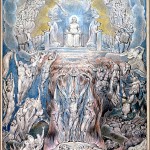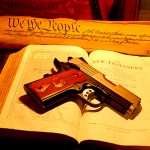My church was obsessed with Israel.
- We believed that Israel becoming a state in 1948 was a sign from God that the Rapture was at hand.
- We believed that two Messianic Jewish prophets would appear in Israel and be killed as martyrs in the Great Tribulation, then rise from the dead to fight the antichrist.
- We believed that if America ever crossed Israel in any way, the former would be instantly wiped out in a nuclear inferno. As a result, any time a politician said something to criticize Israel or support Palestinian Arabs, my church would be abuzz with sounds of doom.
- We believed that Jesus would ultimately return for the Jews, after they had suffered through the Great Tribulation (post-Rapture) and recognized him as the Messiah. Many would die in the process.
- We were taught (although I refused to accept) that the Holocaust was the “tender hand of Jehovah” leading the Jews to Palestine.
- We listened to Zionist music. It was approved alongside Christian music, especially if it had something to do with the founding of the Israeli state.
- Whenever Israel was engaged in combat, we heard about it in church. The two great signs of the end were Israel’s statehood and the collapse of southern California after the San Andreas faultline ruptured. Jerusalem and Los Angeles were like two points at the end of an arrow shot through the middle of the world.
And we read Zionist novels.
The most popular series was The Zion Chronicles by Bodie and Brock Thoene. I recall these books being a pretty enthralling read. They topped my list of favorite church-approved books, alongside Frank Peretti’s allegorical thrillers. (In my defense, I was 12!) Both sets of books were oddly salacious at times. The dashing Moshe Sachar occupied my daydreams for an embarrassing stretch of time.
Looking back, it’s a little weird that I grew up reading Zionist literature. I’m not sure I had ever even talked to a Jewish person by the time my peer group became enthralled with Israel’s forging of a state in Palestine. That American Jews might feel conflicted about or even opposed to the state made no sense to us. We were perpetually fed the storyline of triumph from the Holocaust to Jerusalem, and had no way of knowing that there were other ways to explain history. We weren’t even presented with a fair portrayal of the side we were supposedly reading. Did it feel like a triumph, I wonder, when the survivors tried to put their lives back together without their families, their homes, their friends? Did the Israeli flag somehow make sense of senseless evil? For some, possibly. We were told that it was about symbolic defiance, about courage and persistence. I have no doubt all this patriotic rhetoric cloaked a much more complicated journey; a journey conducted by many alone, scared, weeping, raging and despairing. What right did we have to decide what emotions mattered for people we had never met in a place we had never been? We had no sense of modesty or propriety about our right to tell their history.
It’s more than a little patronizing, creepy and imperialist for American Christians to declare the purpose and fate of the Jewish people as a whole without consulting any of them for their opinions on the matter. Let alone their heinous claim that the Holocaust as God’s design to push the Jews back to the Middle East. This was one of those issues my church waved away with pious language about God’s ways being higher than our ways and inscrutable to us. What that meant in translation, however, was “the ends justify the means.” The staggering hubris of it all, the blatant cruelty horrified me. How could a God like that claim to care about every sparrow? A God who marched millions to their deaths to erect a political flagpole! A God who deliberately “hardened Hitler’s heart” to orchestrate a diaspora? How could a God like that claim to love anyone, anything, ever?
I’m as speechless now as I was then.


















